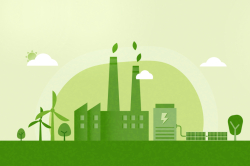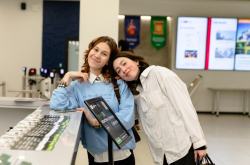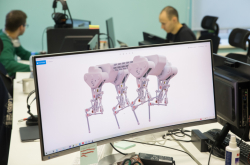The modern industry faces increasing pressure. Nowadays, it is no longer enough to simply be efficient, automated, and technological; facilities have to comply with environmental standards that are becoming stricter year after year. That requires the help of experts who can make production more eco-friendly – a task that is especially relevant in the energy industry.
Recently, ITMO University announced the establishment of the Faculty of Energy and Ecotechnology (GreenTech), which will train engineers for the next generation of green enterprises.
Due to the current COVID-19-related restrictions, the opening of the faculty was held in a hybrid format: some of the guests had the chance to participate in the event in-person, while others joined via Zoom. The meeting was attended by the management of the School of Biotechnology and Cryogenic Systems and the renewed faculty, as well as industry representatives, students, and professors.
“It’s important for us to show that our faculty is open to changes,” says Ekaterina Tambulatova, dean of GreenTech. “We hope that students will see that, and together we’ll create an atmosphere of trust.”

Ecology, energy efficiency, and interdisciplinarity
During the opening ceremony, members of the faculty’s management spoke about the new unit and its future plans. Since the exhaustive transformation of the Faculty of Cryogenic Engineering resulted in the creation of GreenTech, the latter will keep the former’s core specializations while introducing new ones.
“In today’s world, science and education are expanding significantly and new fields and major global challenges appear. That’s why we also have to expand our competencies and modify our School,” says Igor Baranov, head of the School of Biotechnology and Cryogenic Systems, of which GreenTech is a part.

The new unit will possess a wider range of expertise and venture for example, into the fields of bioenergetics and bioconversion. Its specialists will deal with environmental monitoring and sustainable development of unique regions, including the Arctic. The main focus of the faculty’s research and educational programs will lie in the principles of interdisciplinarity, so that graduates could address a wide range of issues using the in-depth knowledge of both engineering and environmental science.
Old and new majors
Following the official ceremony, students had the chance to ask questions, the majority of which concerned the fate of old and new majors and programs. As stressed by Ekaterina Tambulatova, all students will continue their studies within the programs they initially applied for.
“We’re keeping specializations related to thermal physics and cryogenic energy, but they’ll be updated and become part of a broader program – Energy Systems Engineering,” explains Ekaterina Tambulatova. “The new program will cover a wide range of issues in ecology, automation, energy efficiency, energy saving, renewable energy sources, and ecotech. Our graduates will be able to work as engineers in various industries because today, environmental technologies are part of all spheres of the economy.”

The Master’s program line-up will include those previously taught at the Faculty of Cryogenic Engineering, in particular, Compressed Natural Gas Technologies. The dean notes that this program attracts a large number of students and its graduates are in high demand in the industry. As early as next fall, the faculty will launch a new program on the hydrogen economy.
“In 2021, we’ll be launching the Hydrogen Energetics program. This is a promising field, and for now we will be the only ones in the country to train such specialists. We will implement this field together with the School of Photonics,” notes Ekaterina Tambulatova. “We’re also working on a program in technogenic safety and metrology, as they are crucial to the development of ecotechnologies.”

She also adds that in the future the Faculty plans to promote programs in ecology and engage sociologists and psychologists in order to develop not only the students’ professional competencies, but also to imbue them with a comprehensive understanding of ecology and environmental challenges.
“Future graduates who are already pursuing their Bachelor’s degree and planning their future will discover new Master’s programs that are more intensive and rich in competencies than those that have existed at the faculty,” says Igor Baranov.
Internationalization and scientific recognition
Not only educational programs are in need of updating; so are the scientific activities of the faculty. Its team plans to create new laboratories and actively apply for grants, including the so-called “megagrants”. The faculty will focus on interdisciplinary research that has the potential to yield breakthrough results by combining the competencies of different scientists.
“We are also looking for new researchers, and to do so, we’ve identified the most important areas of development. For some of them, we’ve already found specialists and chosen team leads who will attract new staff and work with our international partners,” says Ekaterina Tambulatova.

Another goal is to increase the faculty’s recognition among the scientific community by boosting publication activity and forming global partnerships.
“We are currently negotiating with four researchers who can join us through the Fellowship & Professorship program. These are international scientists who will help increase our publication activity in high-impact journals,” adds the dean of the faculty. “We already have the necessary competencies, now we need to develop them further and move into the next stage.”





